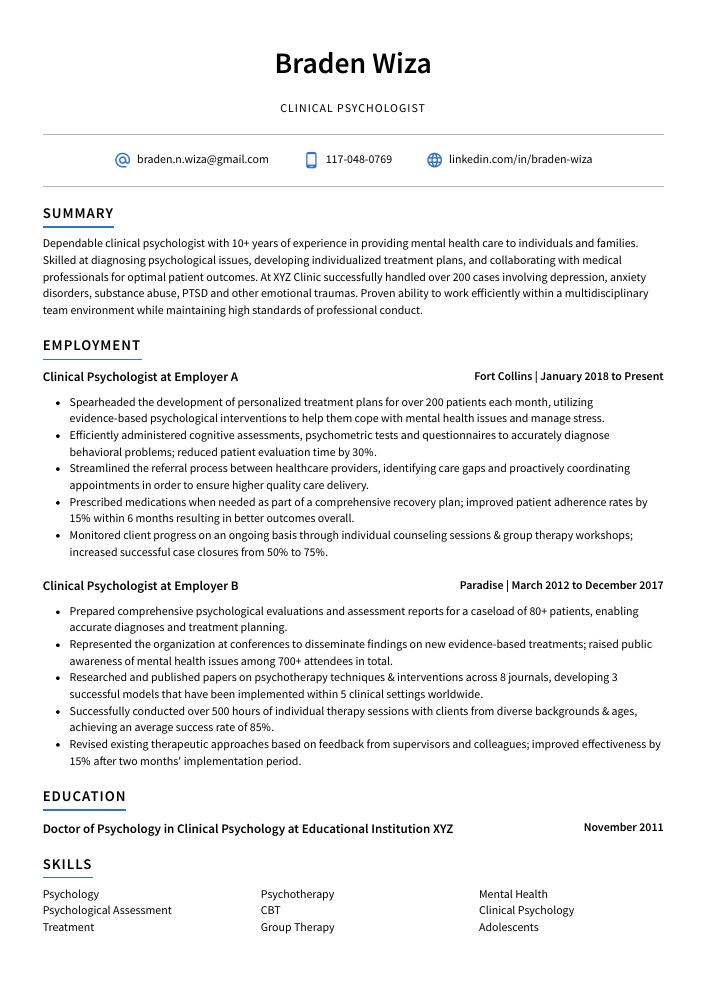Clinical Psychologist Resume Guide
Clinical psychologists work to assess, diagnose, and treat mental health issues in their patients. They use a variety of research-based therapeutic approaches to help people improve their overall functioning and well-being. Furthermore, they provide psychological assessments for individuals or groups using interviews, tests, surveys and other methods.
Having a doctorate in psychology means you’re well-equipped to help people, but potential employers don’t know about your qualifications. To make them aware of your clinical expertise, you must write an impressive resume that stands out from the crowd.
This guide will walk you through the entire process of creating a top-notch resume. We first show you a complete example and then break down what each resume section should look like.
Table of Contents
The guide is divided into sections for your convenience. You can read it from beginning to end or use the table of contents below to jump to a specific part.
Clinical Psychologist Resume Sample
Zena Stoltenberg
Clinical Psychologist
[email protected]
496-922-1134
linkedin.com/in/zena-stoltenberg
Summary
Dependable clinical psychologist with 10+ years of experience in providing mental health care to individuals and families. Skilled at diagnosing psychological issues, developing individualized treatment plans, and collaborating with medical professionals for optimal patient outcomes. At XYZ Clinic successfully handled over 200 cases involving depression, anxiety disorders, substance abuse, PTSD and other emotional traumas. Proven ability to work efficiently within a multidisciplinary team environment while maintaining high standards of professional conduct.
Experience
Clinical Psychologist, Employer A
Las Vegas, Jan 2018 – Present
- Spearheaded the development of personalized treatment plans for over 200 patients each month, utilizing evidence-based psychological interventions to help them cope with mental health issues and manage stress.
- Efficiently administered cognitive assessments, psychometric tests and questionnaires to accurately diagnose behavioral problems; reduced patient evaluation time by 30%.
- Streamlined the referral process between healthcare providers, identifying care gaps and proactively coordinating appointments in order to ensure higher quality care delivery.
- Prescribed medications when needed as part of a comprehensive recovery plan; improved patient adherence rates by 15% within 6 months resulting in better outcomes overall.
- Monitored client progress on an ongoing basis through individual counseling sessions & group therapy workshops; increased successful case closures from 50% to 75%.
Clinical Psychologist, Employer B
Scottsdale, Mar 2012 – Dec 2017
- Prepared comprehensive psychological evaluations and assessment reports for a caseload of 80+ patients, enabling accurate diagnoses and treatment planning.
- Represented the organization at conferences to disseminate findings on new evidence-based treatments; raised public awareness of mental health issues among 700+ attendees in total.
- Researched and published papers on psychotherapy techniques & interventions across 8 journals, developing 3 successful models that have been implemented within 5 clinical settings worldwide.
- Successfully conducted over 500 hours of individual therapy sessions with clients from diverse backgrounds & ages, achieving an average success rate of 85%.
- Revised existing therapeutic approaches based on feedback from supervisors and colleagues; improved effectiveness by 15% after two months’ implementation period.
Skills
- Psychology
- Psychotherapy
- Mental Health
- Psychological Assessment
- CBT
- Clinical Psychology
- Treatment
- Group Therapy
- Adolescents
Education
Doctor of Psychology in Clinical Psychology
Educational Institution XYZ
Nov 2011
Certifications
American Board of Professional Psychology (ABPP)
American Board of Clinical
May 2017
1. Summary / Objective
Your resume summary should be a concise and compelling overview of your clinical psychology experience. It should highlight the skills, qualifications, and accomplishments that make you an ideal candidate for the job. For example, you could mention any specializations or certifications in areas such as cognitive behavioral therapy (CBT) or trauma-focused CBT; your ability to work with diverse populations; and how you have successfully helped clients improve their mental health through evidence-based treatments.
Below are some resume summary examples:
Seasoned clinical psychologist with 10+ years of experience providing psychotherapy to adults, children and adolescents in individual, couples and family settings. Skilled at leveraging evidence-based practices such as CBT, DBT Mindfulness-Based Stress Reduction (MBSR) to help clients address a variety of mental health concerns including depression, anxiety disorders and addiction recovery. Dedicated to creating safe spaces for individuals struggling with complex emotional issues by listening empathically while offering practical solutions.
Hard-working clinical psychologist with four years of experience in a variety of therapeutic settings. Highlights include providing individual, family, and group therapy sessions to help clients gain insight into their problems; conducting psychological assessments; developing treatment plans for patients suffering from mental health issues such as anxiety and depression. Passionate about helping individuals reach their full potential by providing evidence-based treatments that are tailored to each client’s needs.
Committed and compassionate clinical psychologist with 8+ years of experience in the mental health field. Skilled at providing individual and group therapy to children, adolescents, and adults from a variety of backgrounds. Highly experienced in assessments such as psychological testing, diagnosis determination, case conceptualization, treatment planning and implementation. Expertise in working with people who have experienced trauma or are struggling with addiction issues.
Detail-oriented clinical psychologist with 10+ years of experience providing evidence-based mental health care to a diverse clientele. Skilled in conducting psychotherapy, assessments, and evaluations while maintaining patient confidentiality. At XYZ Clinic, implemented an innovative treatment structure that increased patient satisfaction by 27%. Seeking to join ABC Health as a clinical psychologist and continue delivering quality patient care.
Well-rounded clinical psychologist with over 10 years of experience providing care to a wide range of patients, from children to adults. Certified in Cognitive Behavioral Therapy and trained in multiple evidence-based interventions. Passionate about using my skillset to help others reach their potential at ABC Mental Health Center. Notable accomplishments include reducing patient anxiety levels by 40% through innovative treatment approaches.
Skilled clinical psychologist with 5+ years of experience providing mental health counseling and assessments to diverse clients. Skilled in using evidence-based therapeutic approaches, such as Cognitive Behavioral Therapy (CBT), Dialectical Behavior Therapy (DBT) and Acceptance Commitment Therapies (ACT). Seeking to join ABC Mental Health Center where my knowledge can help support the organization’s mission of improving community wellbeing.
Accomplished clinical psychologist with 10+ years of experience providing evidence-based therapeutic services to a wide range of clients. Specializing in cognitive behavioral therapy, dialectical behavior therapy, and mindfulness meditation techniques. Seeking to join ABC Clinic to provide comprehensive mental health care and build positive relationships with patients.
Enthusiastic and dedicated clinical psychologist with 8+ years of experience in providing evidence-based treatments to clients. Skilled at utilizing a wide range of therapeutic interventions, including CBT, DBT, and psychodynamic therapy. Seeking to join ABC Clinic as a senior clinician where I can continue helping individuals dealing with mental health issues.
2. Experience / Employment
The employment (or experience) section is the place to talk about your work history. It should be written in reverse chronological order, with your most recent job listed first.
Stick to bullet points when writing this section; doing so makes it easier for the reader to take in what you have said quickly and effectively. When writing each point, provide detail on what you did and any results achieved from that action.
For example, instead of saying “Provided therapy,” you could say, “Conducted weekly individual counseling sessions with adolescents suffering from depression or anxiety disorders; helped reduce symptoms by an average of 50% over a six-month period.”
To write effective bullet points, begin with a strong verb or adverb. Industry specific verbs to use are:
- Diagnosed
- Evaluated
- Treated
- Counseled
- Facilitated
- Assessed
- Monitored
- Intervened
- Collaborated
- Referred
- Documented
- Prescribed
- Educated
- Supported
- Researched
Other general verbs you can use are:
- Achieved
- Advised
- Compiled
- Coordinated
- Demonstrated
- Developed
- Expedited
- Formulated
- Improved
- Introduced
- Mentored
- Optimized
- Participated
- Prepared
- Presented
- Reduced
- Reorganized
- Represented
- Revised
- Spearheaded
- Streamlined
- Structured
- Utilized
Below are some example bullet points:
- Independently provided evidence-based psychotherapeutic treatment to over 150 patients with mental health disorders, successfully reducing symptoms in 80% of them.
- Facilitated weekly therapy sessions and individualized care plans for clients with depression, anxiety, addiction and other psychological issues; supported their recovery journey on an ongoing basis.
- Documented patient progress notes, assessments and case histories while adhering to HIPAA regulations; collaborated closely with multidisciplinary professionals such as psychiatrists and social workers when needed.
- Referred clients to psychiatric hospitals or outpatient clinics when appropriate; further connected them to external resources such as support groups or community services where indicated.
- Mentored junior clinical psychologists in the effective use of cognitive behavioral therapy (CBT) techniques by providing one-on-one counseling sessions twice a week for 3 months straight.
- Expedited the diagnosis and treatment of mental health disorders in over 180 patients, reducing the average wait time by 17%.
- Introduced cognitive behavioral therapy (CBT) to treat anxiety and depression in a therapeutic setting; achieved an 84% success rate among clients within 1 year.
- Utilized evidence-based approaches such as psychotherapy, psychoanalysis, family counseling and play therapy to help individuals improve their emotional wellbeing.
- Structured individualized care plans for each patient based on psychological assessments, interviews and lab tests; helped reduce dropout rates from therapy sessions by 10%.
- Resourcefully developed online seminars & educational materials about self-care tips for stress management that reached out to more than 500 people across 3 states nationwide.
- Collaborated with other medical professionals to develop individualized treatment plans for over 200 patients with mental health issues, reducing the duration of their symptoms by an average of 25%.
- Advised and counseled clients on various psychological techniques and strategies to overcome anxiety, depression and stress-related disorders; successfully reduced patient visits from 8/month to 4/month due to improved recovery rates.
- Accurately identified underlying causes of distress through clinical interviews and diagnostic testing procedures; developed effective coping mechanisms that resulted in a 75% improvement rate among all patients within 6 months.
- Intervened during crisis situations via emergency counseling sessions while also providing psychoeducation resources such as books, articles & videos; decreased incident rate by 50%.
- Evaluated client progress using weekly assessments based on DSM criteria which enabled accurate diagnosis leading to successful long-term treatments for 95% of cases reviewed each month.
- Coordinated and facilitated individual and group therapy sessions for over 150 clients in the past year, demonstrating exceptional communication skills when providing counseling and psychological support services.
- Formulated comprehensive diagnostic assessments based on patient interviews, clinical observations, behavioral testing and other sources of data; successfully identified underlying issues in 97% of cases within two weeks.
- Developed evidence-based treatment plans to address a wide range of mental health concerns including depression, anxiety disorders, substance abuse and post-traumatic stress disorder (PTSD).
- Compiled detailed reports that included diagnosis summaries as well as progress notes from all therapy sessions conducted; reduced administrative paperwork time by 30%.
- Competently utilized various psychotherapeutic approaches such as cognitive behavior therapy (CBT), dialectical behavior therapy (DBT) and solution focused therapies to best suit each client’s needs.
- Diligently provided clinical psychological care and treatment to over 100 patients per week, achieving a 98% satisfaction rate amongst clients.
- Presented educational seminars on mental health topics such as depression, stress management and addiction to community organizations across the city; increased attendance by 25%.
- Achieved remarkable results in reducing symptoms of anxiety in long-term patients through cognitive behavioral therapy (CBT) techniques; improved patient outcomes by 40%.
- Reduced overall waiting list for psychiatric services at two local hospitals from 6 months to 4 weeks within one year due to efficient scheduling system implementation.
- Optimized program delivery standards according to best practices guidelines set out by the American Psychological Association (APA).
- Counseled over 100 individuals and families in need, dealing with a wide range of psychological issues such as depression, anxiety, family conflicts and addictions; improved client outcomes by 40% within 3 months.
- Educated clients on emotional regulation techniques that helped reduce stress levels in high-pressure situations while boosting their self-confidence.
- Supported patients through psychotherapy sessions to help them identify patterns of behavior causing distress or impairment in daily life; reduced symptoms of mental health disorders by 70%.
- Assessed patient needs using clinical tests & surveys to develop individualized treatment plans for each case which increased compliance rates from 50% to 80%.
- Consistently monitored progress towards goals during therapy sessions and provided feedback accordingly resulting in an overall satisfaction rate of 85%.
- Reorganized patient records and billing system, resulting in a 15% decrease in administrative errors.
- Participated in weekly team meetings to develop treatment plans for 200+ patients with mental health issues such as depression, anxiety, PTSD and bipolar disorder.
- Diagnosed behavioral problems using structured interviews and psychological assessment tools; successfully identified underlying disorders of 30+ complex cases within the first year of practice.
- Effectively conducted individual therapy sessions based on CBT techniques to help clients cope with their emotional distress; improved client satisfaction ratings by 10%.
- Treated 25+ adolescents struggling with substance abuse through psychotherapy & pharmacology-based interventions which resulted in an overall reduction in relapse rates by 23%.
3. Skills
Skill requirements will differ from employer to employer – this can easily be determined via the job advert. Organization ABC may require the candidate to have experience in treating anxiety disorders and Organization XYZ may be looking for someone with expertise in working with adolescents.
It is essential to tailor your skills section of your resume to each job that you are applying for. This is because many employers utilize applicant tracking systems, which scan resumes for certain keywords before passing them on to a human.
Once listed here, you can further elaborate on your skillset by discussing it in more detail elsewhere; such as within the summary or experience sections.
Below is a list of common skills & terms:
- Adolescents
- Adults
- Anger Management
- Behavioral Health
- CBT
- Child Development
- Clinical Psychology
- Clinical Research
- Clinical Supervision
- Cognition
- Cognitive Behavioral Therapy
- Counseling Psychology
- Crisis Intervention
- DBT
- Family Therapy
- Forensic Psychology
- Group Therapy
- Health Psychology
- Healthcare
- Interventions
- Life Transitions
- Mental Health
- Mental Health Counseling
- Mindfulness
- Motivational Interviewing
- Neuropsychological Assessment
- Neuropsychology
- Play Therapy
- Post Traumatic Stress
- Program Development
- Psychodynamic Psychotherapy
- Psychological Assessment
- Psychological Testing
- Psychology
- Psychotherapy
- SPSS
- Self Esteem
- Social Services
- Stress
- Stress Management
- Teaching
- Therapists
- Treatment
- Working With Adolescents
- Young Adults
4. Education
Including an education section on your resume is essential for a clinical psychologist, as the job requires extensive training and qualifications. List your highest educational achievement first, such as any doctoral degrees you may have earned. Then list other relevant qualifications in descending order of importance.
Include courses or research projects related to psychology that are pertinent to the role you are applying for, such as abnormal psychology or cognitive behavioral therapy (CBT). Additionally, if you have taken continuing education classes since graduating with your degree(s), include those too.
Doctor of Psychology in Clinical Psychology
Educational Institution XYZ
Nov 2011
5. Certifications
Certifications are a great way to demonstrate your expertise in a particular field. Employers often look for certifications when hiring, as it shows that you have taken the time and effort to become proficient in an area relevant to their business.
Including any certifications on your resume can be beneficial if they are related to the job you are applying for or show that you possess certain skills necessary for success in the role. Make sure these certifications are up-to-date and accurate so employers know they can trust them.
American Board of Professional Psychology (ABPP)
American Board of Clinical
May 2017
6. Contact Info
Your name should be the first thing a reader sees when viewing your resume, so ensure its positioning is prominent. Your phone number should be written in the most commonly used format in your country/city/state, and your email address should be professional.
You can also choose to include a link to your LinkedIn profile, personal website, or other online platforms relevant to your industry.
Finally, name your resume file appropriately to help hiring managers; for Zena Stoltenberg, this would be Zena-Stoltenberg-resume.pdf or Zena-Stoltenberg-resume.docx.
7. Cover Letter
Writing a cover letter is an important part of the job application process. It provides you with the opportunity to explain why you are a great fit for the role and how your skills and experience make you unique from other candidates.
Cover letters should be 2 to 4 paragraphs long and separate from your resume, yet complement it by providing additional detail about who you are as a professional. Whilst not always required, writing one can help give recruiters more insights into who you are and what value you could bring to their organisation.
Below is an example cover letter:
Dear Eulalia,
I am interested in applying for the clinical psychologist position at [clinic name]. I am a licensed clinical psychologist with 6 years of experience working in outpatient mental health clinics. I have worked with clients of all ages, from children to adults, and have experience treating a variety of psychological disorders.
I am passionate about helping my clients improve their lives and reach their full potential. I use a strengths-based approach and tailor my treatment plans to meet the unique needs of each client. I have extensive training in cognitive-behavioral therapy (CBT) and specialize in treating anxiety disorders and depression. I am also experienced in administering psychological assessments, such as intelligence tests, personality tests, and diagnostic interviews.
I believe that I would be an excellent addition to your team at [clinic name]. My experience, skills, and dedication to helping others make me confident that I would be able to contribute to your clinic’s success. I look forward to discussing this opportunity further with you soon.
Sincerely,
Zena
Clinical Psychologist Resume Templates
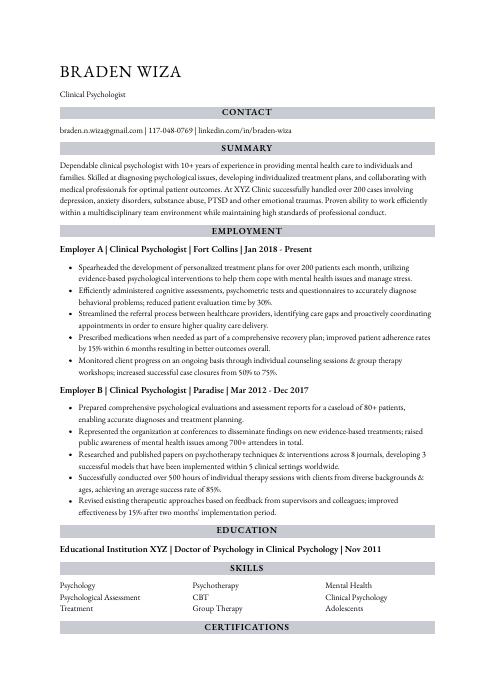 Numbat
Numbat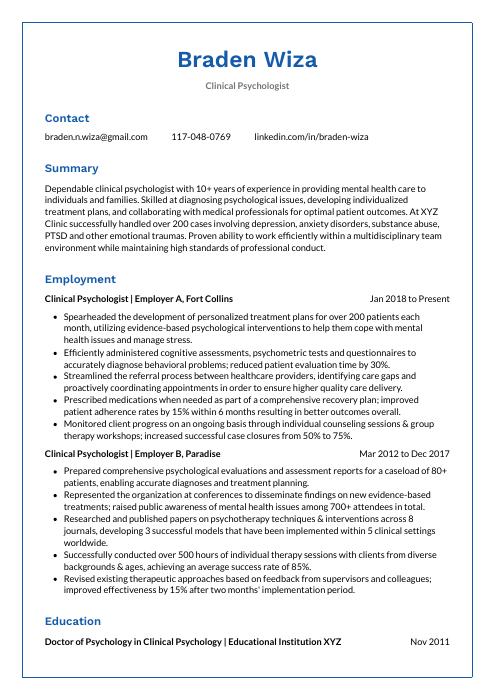 Markhor
Markhor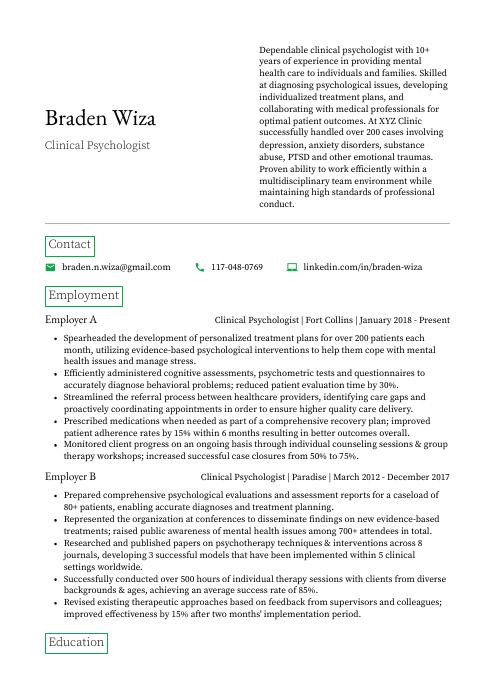 Quokka
Quokka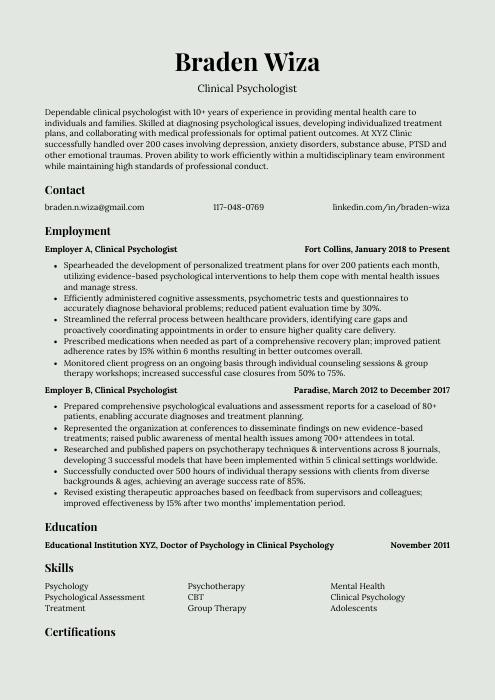 Saola
Saola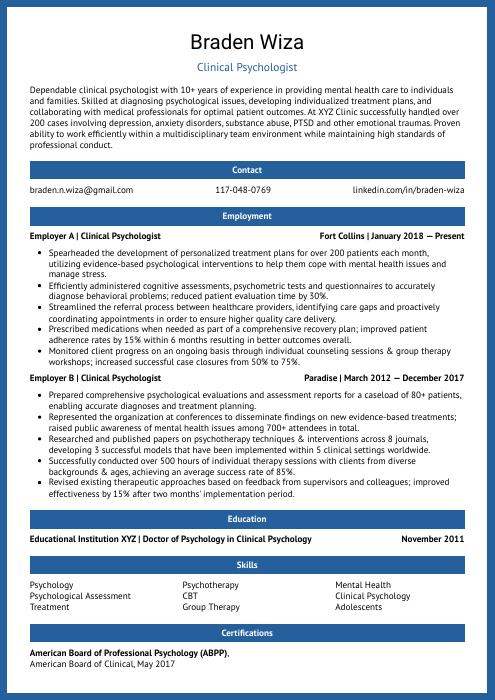 Ocelot
Ocelot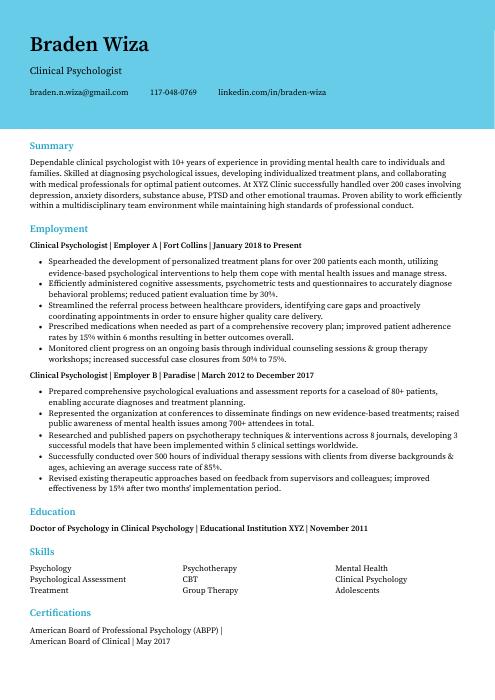 Dugong
Dugong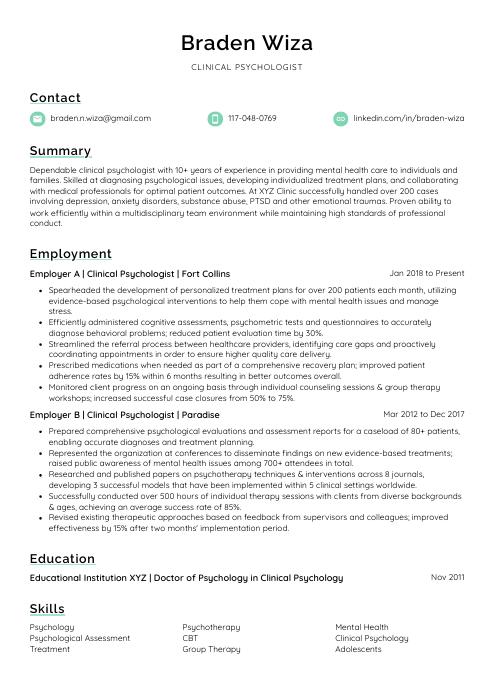 Lorikeet
Lorikeet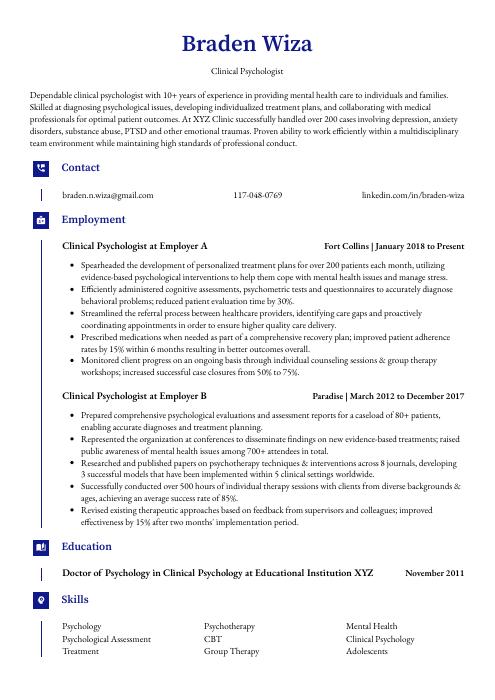 Gharial
Gharial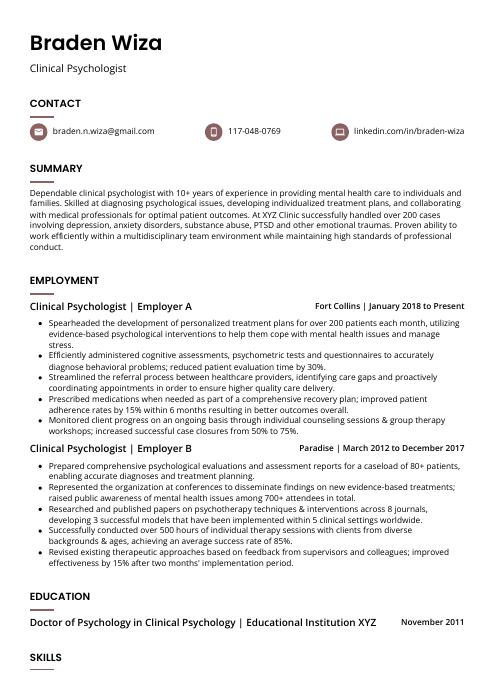 Fossa
Fossa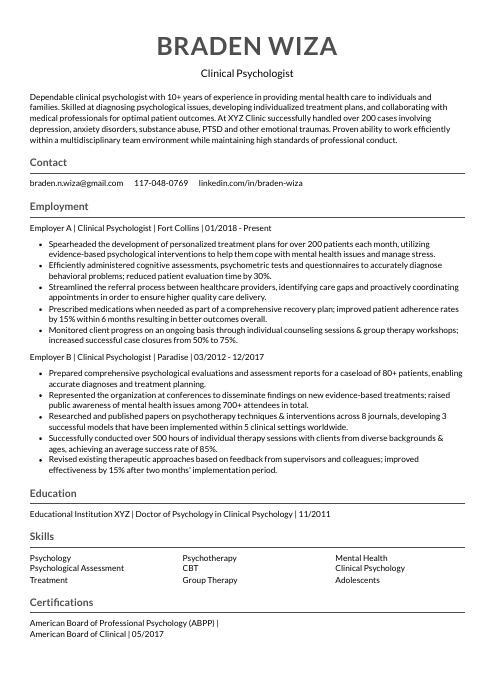 Indri
Indri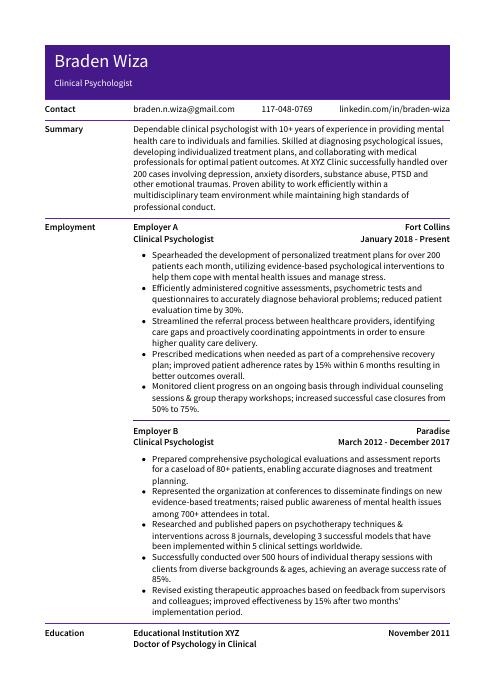 Pika
Pika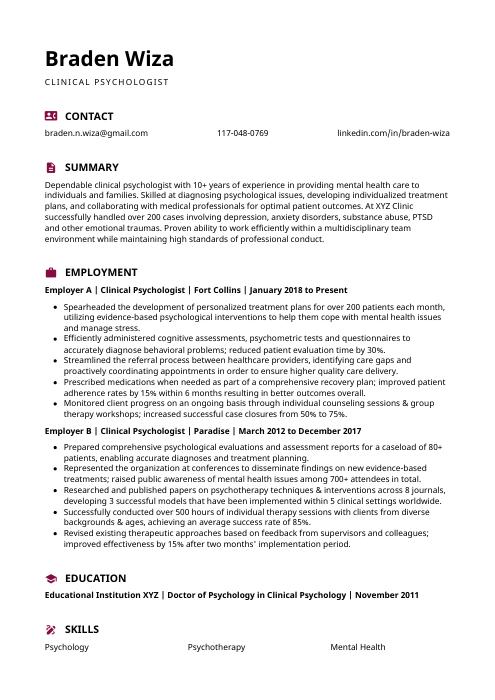 Hoopoe
Hoopoe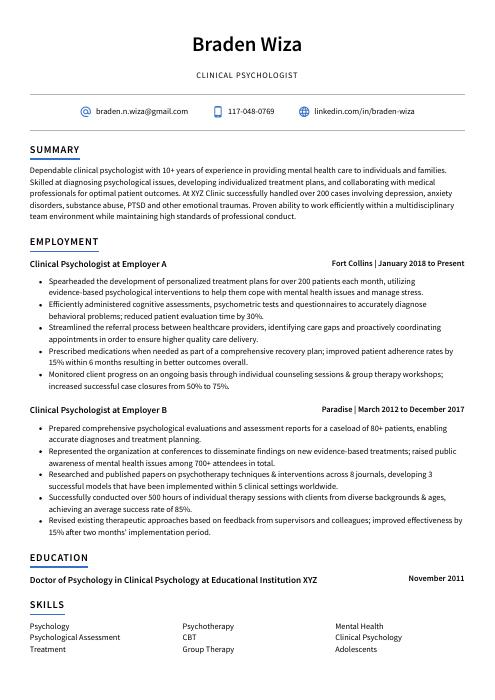 Axolotl
Axolotl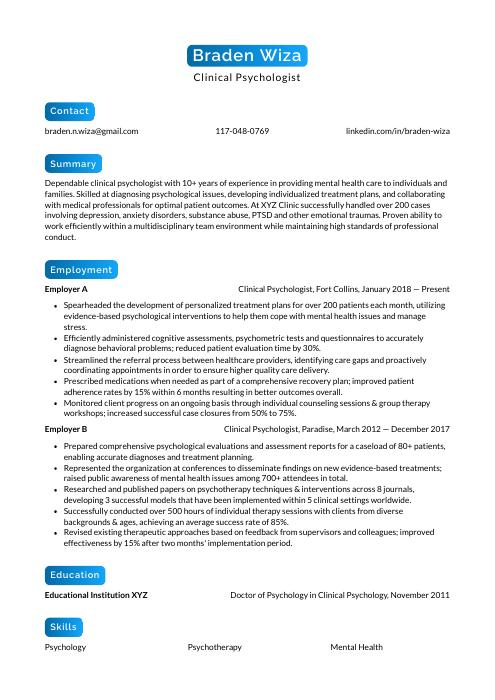 Kinkajou
Kinkajou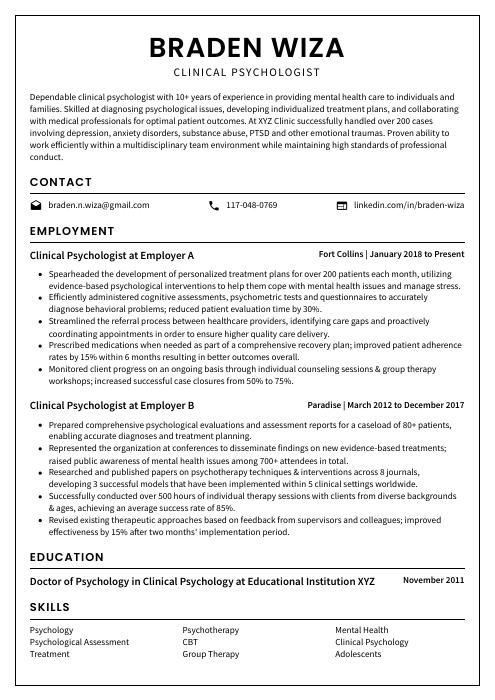 Cormorant
Cormorant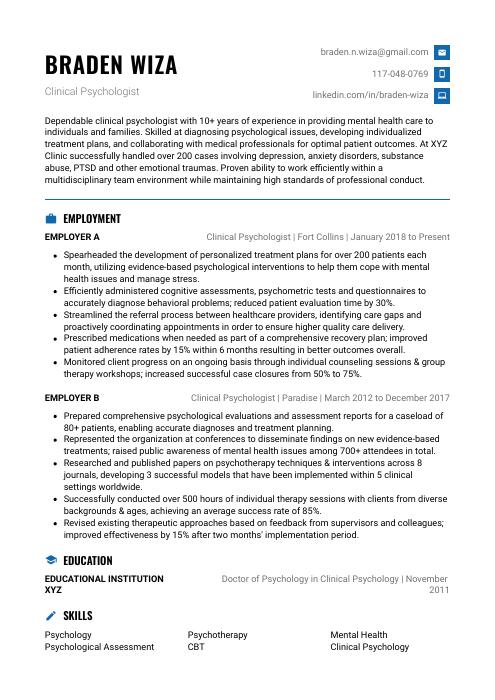 Echidna
Echidna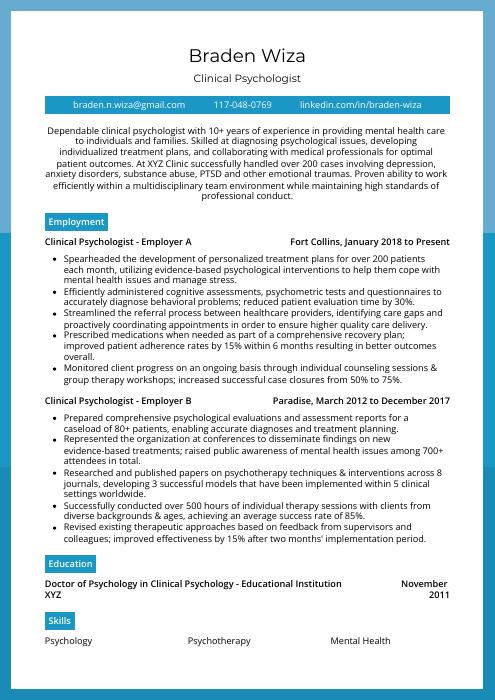 Rhea
Rhea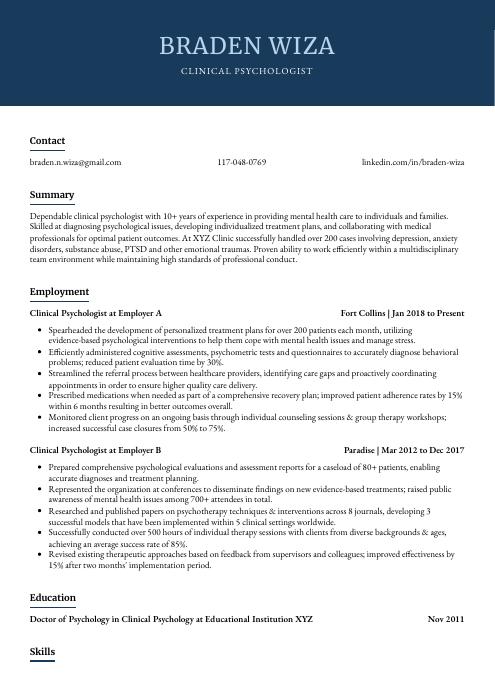 Bonobo
Bonobo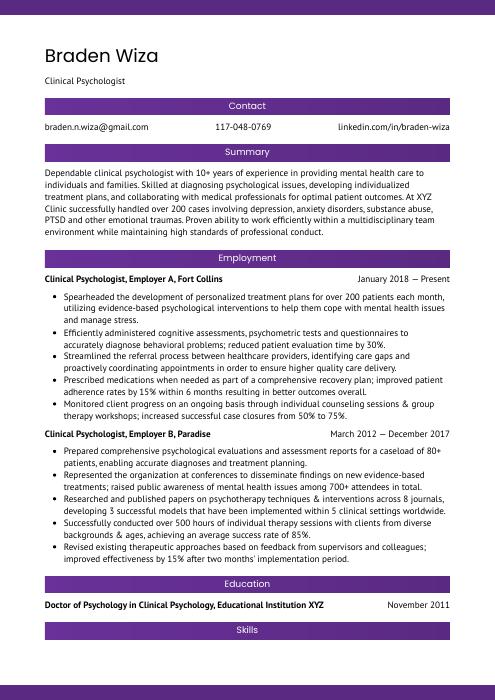 Jerboa
Jerboa Rezjumei
Rezjumei
